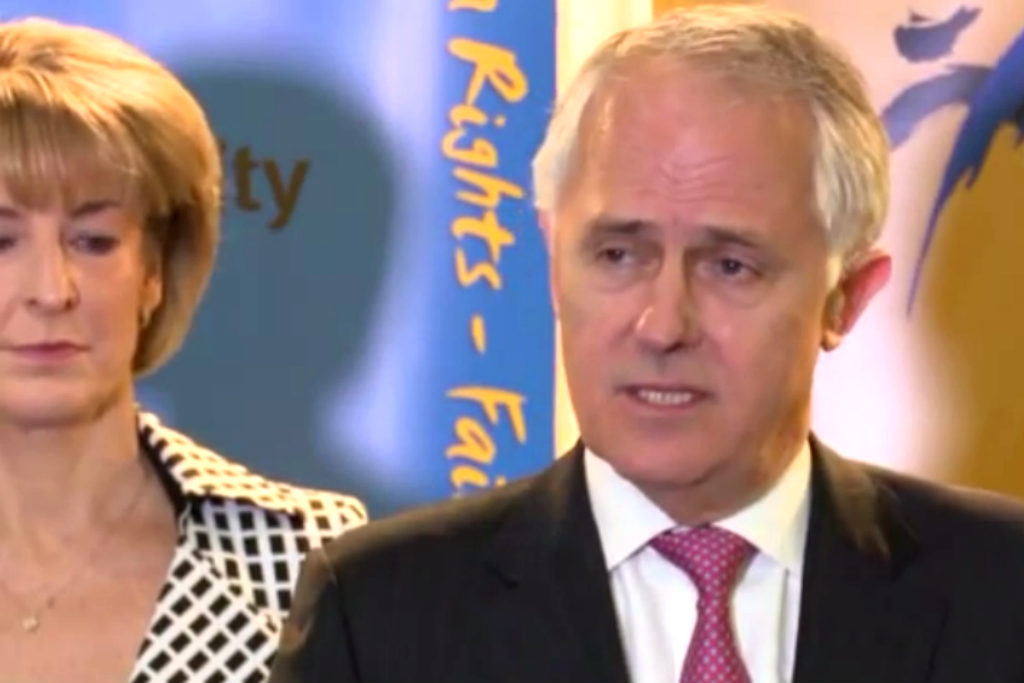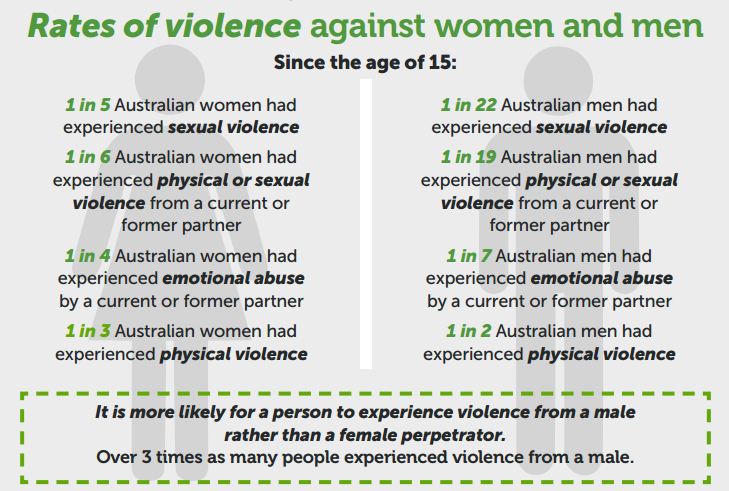If We’re Serious About Combating Violence Against Women, We Can’t Ignore The Culture Of Our Politics
Too many political institutions and practices in Australia reinforce the idea that demeaning, dismissing and threatening women is excusable, or even desirable

With major media outlets, prominent public figures and high-profile campaigns all pushing hard for change over the last year, Australians are increasingly expectant that action against domestic violence will become as urgent a political priority as it is a social one. Several state governments have responded strongly to the new public mood, with a royal commission into family violence currently underway in Victoria, and former Governor-General Quentin Bryce given free rein to overhaul domestic violence laws in Queensland earlier this month.
Now the federal government appears to be getting the message. Flanked by former Victoria Police Chief Commissioner Ken Lay and Australian of the Year Rosie Batty, newly-minted Prime Minister Malcolm Turnbull announced a $100 million funding package for domestic violence services at a press conference yesterday morning.
Key details of the Turnbull govt’s new domestic violence package: pic.twitter.com/jff7eSmt5Y
— Sky News Australia (@SkyNewsAust) September 23, 2015
While these welcome measures reflected well on the new PM, they were largely developed under Tony Abbott — a similar package was meant to be announced last Friday, but it was pushed back following the change of leadership on the Monday.
And while $100 million is an impressive-sounding figure, women’s equality campaign group Fair Agenda warns that the measures “will still leave thousands of women without access to the services they need to stay safe and escape their abusers,” and won’t provide counsellors, caseworkers and others working to make victims of domestic violence secure and safe with anything like the support or resources they need to do their jobs properly.
The nitty-gritty of that specific policy announcement aside, though, it’s worth examining the rhetorical side of what the Prime Minister said yesterday. Turnbull delivered some pretty strong words on how Australian culture regards women, arguing that sexist jokes, outdated attitudes and sexual objectification all contribute to a society in which domestic violence is more likely to happen, and where men are likely to think being violent towards women is acceptable.
“I’d say that as parents, one of the most important things we must do is ensure that our sons respect their mothers and their sisters. Violence against women begins with disrespecting women. And so this is a big cultural shift,” Turnbull said. “Let me say this to you: disrespecting women does not always result in violence against women. But all violence against women begins with disrespecting women.”
Turnbull’s been rightly praised since then, both for the funding commitment and his comments while announcing it. Hearing a sitting Prime Minister talk so frankly about the complex social and cultural issues we need to address if we’re really going to solve a problem like this is a big first step.
But if Turnbull’s serious about acknowledging that “all violence against women begins with disrespecting women,” and recognising that challenging disrespectful and harmful attitudes to women is vital to solving this problem, then he’s going to have to be brutally honest about how the current state of our politics contributes to that culture of disrespect — especially inside his own party.
–
“Meow”: The Casual Misogyny Of The Australian Senate
At both a national and state level, women in politics routinely confront cultures of sexism, casual misogyny and gendered disrespect, which are so deeply entrenched that the male politicians who perpetuate them are often unable to recognise them for what they are, or even comprehend that they exist. A few days ago, Labor Senator Penny Wong described how many male politicians in federal Parliament are so used to using gendered insults and slurs as a form of political debate that they get offended when they’re called out on it.
“When we look at politics, sometimes I feel we haven’t come far at all. Eric Abetz has gone and been replaced by George Brandis and that’s not much better,” Wong told a conference on Sunday. “They’re so blind to it, so accustomed to belittling women, it’s just par for the course. There’s a long way to go in terms of how people talk to each other.”
She should know. From Senators like Barry O’Sullivan joking about how his counterparts “might like to hear a man’s voice” in meetings, to the now-infamous “meow” incident, a disturbingly high number of men in the country’s second-highest legislative body seem to regard their female colleagues with a mixture of amusement and contempt.
One of the worst offenders in this regard is Attorney-General George Brandis. He was the main instigator of the push to have Human Rights Commission President Gillian Triggs sacked earlier this year — a push which frequently resorted to aggressive gendered attacks on Triggs and the female Senators defending her during Senate questioning. Senator Ian Macdonald even instructed Triggs on how he wanted her to answer questions.
Despite Turnbull’s seemingly enlightened words on how disrespecting women is unacceptable, Brandis received a promotion to Government Leader in the Senate in the recent Cabinet reshuffle. If Turnbull wants to challenge casual misogyny and sexism in Australian culture, he could do a fair bit better than rewarding those in his own party who perpetuate it.
It’s also worth noting the behaviour of politicians in the House of Representatives like George Christensen, who responded to a critical article written by SBS comedian Rebecca Shaw earlier this week by posting a photo of her on his Facebook page without her permission and drawing attention to her appearance. Shaw was immediately subjected to a barrage of sexist attacks and threatening language before Christensen eventually took the photo down, claiming it was “a joke”.

–
State Of Denial: Downplaying Domestic Violence In State Parliaments
The dominant political culture is actively hostile to women, often to a shocking extent — and it’s not just happening at a federal level. About a week ago, eight female members of the Northern Territory’s Legislative Assembly walked out of Parliament in protest at Territory Attorney-General John Elferink’s “bullying and intimidation”. Last week Elferink told Labor MLA Natasha Fyles that he’d like to “give her a slap”; he also slammed his fists on a desk and shouted while Labor’s Lynne Walker was speaking in Parliament. If “violence against women begins with disrespecting women,” it’s difficult to go past that kind of behaviour.
Elferink’s comments are appalling, but what’s really telling is how his government responded to them. NT Chief Minister Adam Giles has resisted calls for Elferink to be sacked, saying sexist and racist taunts as part of political debate “are things that are paraded in Parliament every single day”. NT Treasurer Dave Tollner went further, saying he would have told those who took exception to Elferink’s remarks to “toughen up, princess” if he’d made them.
In NSW, Premier Mike Baird has previously spoken out against sexist attitudes that “only serve to drive women away” from politics. Last year he condemned a male Nationals MP, John Williams, who told a female colleague who’d been raped as a teenager that he’d like to “tear her a new orifice” and that she’d “never had a real man.”
But other members of Baird’s government seemingly get a free pass. Yesterday afternoon Peter Phelps, the chief government whip in NSW’s Legislative Council, wrote the following in response to a tweet by ABC Radio National presenter Patricia Karvelas:
@PatsKarvelas I abhor violence, but perhaps it’s worth reflecting on a double standard that women are permitted to slap men? @alsotheabyss — Peter Phelps MLC (@PeterPhelpsMLC) September 24, 2015
Phelps has defended his comments, citing as evidence several articles from American feminist site Jezebel that explore whether there is a societal ‘double standard’ around female-on-male violence, claiming that he was talking about “slapping” specifically as opposed to domestic violence in general, and emphasising that he believes “all aggressive violence is immoral, irrespective of who commits it or their justification for doing so.”
But equating a woman slapping a man to its opposite is disingenuous and misleading, given women are far more likely to be assaulted or murdered by men than the other way around. And when a small handful of one-punch attacks against young men in the Sydney CBD result in sweeping law changes, while the domestic violence epidemic is met with cuts to frontline domestic violence services — as the Baird government did in 2014 — arguing that “all aggressive violence is immoral” doesn’t really cut it as an excuse.
Too many political institutions and practices in Australia reinforce the idea that demeaning, dismissing and threatening women is excusable, or even desirable. At some point, a real commitment to opposing domestic violence is going to butt up against entrenched habits and those who practice them. Whenever that happens, leaders like Turnbull, Baird, Giles and others need to make a choice about which comes first.
If Turnbull is right when he says “all violence against women begins with disrespecting women,” then the culture of our politics is contributing to a wider social degradation of women, and to domestic violence in turn. If that’s the case, our political culture needs to change. Whether our new PM is up to that task remains to be seen.
–
If you or someone you know is impacted by sexual assault, domestic or family violence, call 1800RESPECT on 1800 737 732 or visit 1800RESPECT.org.au. In an emergency, call 000.
Men can access anonymous confidential telephone counselling to help to stop using violent and controlling behaviour through the Men’s Referral Service on 1300 766 491.
